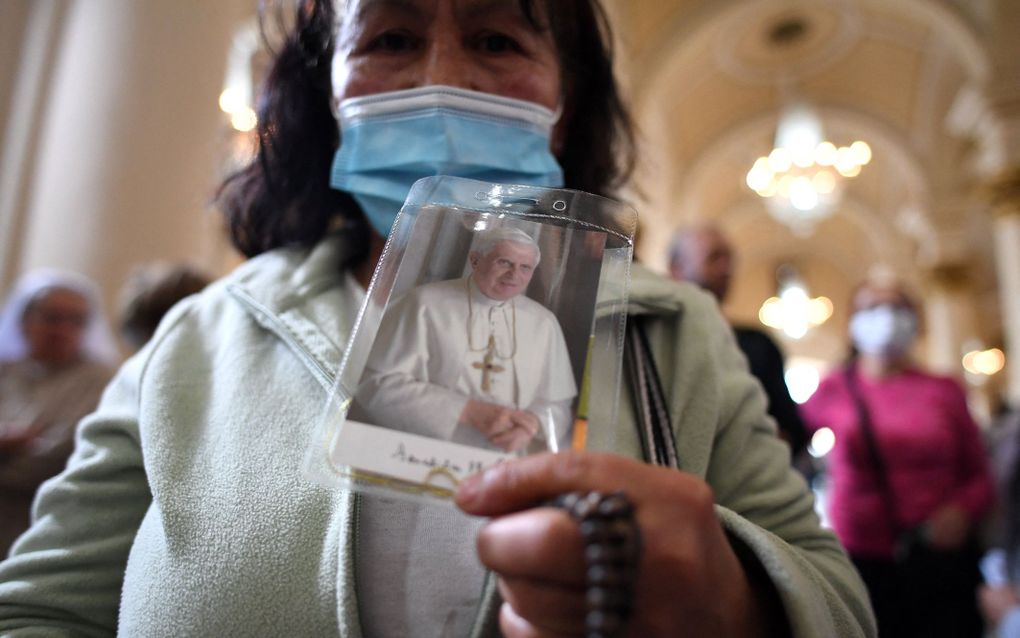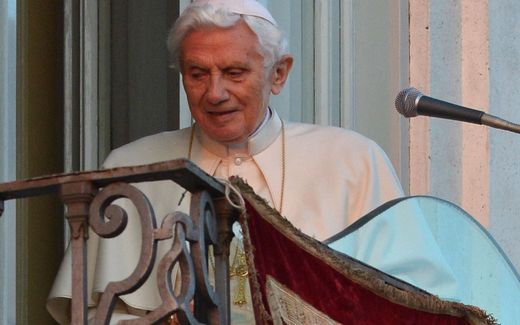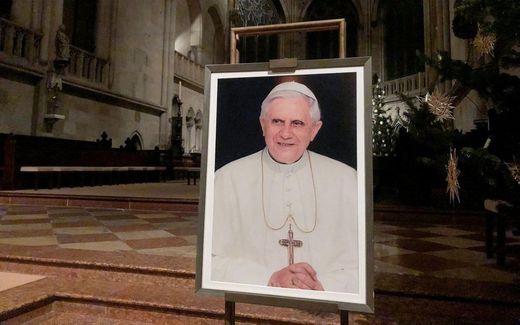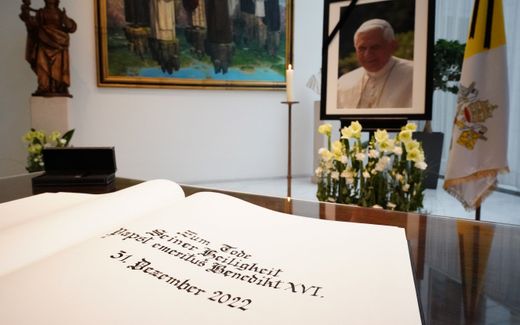Weekly column from Spain: Press shows Pope is still very powerful
06-01-2023
Christian Life
Jorge Ruiz Ortiz, CNE.news

Catholic believers over the whole world were connected to the funeral of former Pope Benedict. This picture is taken in Bogota, Colombia. Photo AFP, Raul Arboleda
Christian Life
Spanish journalists use the word “emeritus” quite often the last ten years. Even common people on the streets do this nowadays. They did not do so in the past. Two people are responsible for this: King Juan Carlos I and Joseph Ratzinger.
An “emeritus” is “a person who has retired and maintains his honours and some of his functions”, according to the Royal Academy Dictionary.
Jorge Ruiz (1969) was born in Barcelona, Spain. At the age of 19, he was converted to the Christian faith.

He graduated in Journalism at the University of Barcelona and received a PhD in Theology at the Faculté Libre de Théologie Réformée in Aix-en-Provence, France. He serves as a Protestant pastor in the Iglesia Reformada Continuada, in Rubí (Barcelona, Spain). He is assessor for the Trinitarian Bible Society for the Spanish and French projects. He is married and father of four.
Our former King Juan Carlos I abdicated in June 2014. Joseph Aloisius Ratzinger (aka pope Benedict XVI), abdicated a year earlier, in 2013, and who has passed away last December 31.
First emeritus
“The first pope emeritus for centuries.” This is how the press in Spain –for example, the public TVE channel– has been continuously reporting the death and funeral of Benedict XVI. But this is a rather important distortion of the facts – I do not know if voluntary or not.
Of course, Benedict XVI was not the first pope to abdicate. The last to do so was Gregory XII, in 1415, in order to put an end to the so-called Western Schism (1378-1417), in the context of the resounding affirmation of the supremacy of the council over the pope made by the Council of Constance. The two previous resignations, that of Benedict IX, in 1045, and that of Celestine V, in 1294, were not exactly edifying spectacles. The first, in a real papal mess, with simonies in between, and the second that ended with Benedict IX being imprisoned by his successor, Boniface VIII, who considered him a danger to his papacy.
Paradoxical
It is one thing to abdicate –and thus the pope ceases to be pope, and resumes his previous office (cardinal) or retires himself from all office altogether– and another thing is to adopt the title of “pope emeritus”. In fact, Benedict XVI was the first pope in history to adopt this title. This is both paradoxical and enigmatic. Because the pope of the Roman Catholic Church has become such by virtue of being the bishop of Rome. After the abdication and enthronement of another new pope –then another new bishop of Rome– how can he be “pope emeritus” without being pope, because he is no longer the bishop of Rome?
The ambiguity is maintained until the funeral itself. The press reports that the funeral chapel receives thousands of visitors –some 65,000 people a day– who bid farewell to pope Benedict XVI. It is specified that the corpse is not wearing the symbols of papal power – the pallium and the so-called Ring of the Fisherman. However, he will be buried in the title of pope, Benedict XVI, which he has kept, therefore, until his death. It is also reported that he will be buried with the pallium and the Ring of the Fisherman, but placed in the tomb.
Real reasons
What were the real reasons for Benedict XVI's resignation? Age? Well, he has lived almost 10 years longer after his abdication. His state of health? John Paul II's health, during his last years, was not exactly optimal, let's say.

In any case, his state of health has not prevented him from writing theologically significant works. Such as, for example, “Grace and Vocation without Remorse: Comments on the Treatise De Iudaeis” (2018), in which he tried to define one of the most important theological questions opened after Vatican II – namely, the sense of the affirmation that the Old Covenant with the Jewish people is still in force.
Or more recently, in the year 2020, he published, together with Cardinal Robert Sarah, “From the Depths of Our Hearts”, a passionate book in which he categorically took a position against opening the ministry to married priests... and this, in the face of the request, to the contrary, of the Synod for Amazonia, which will eventually be dealt with at the next Synod of Bishops, next October.
Latin Mass
Everything seems, therefore, to indicate that, whatever the real reasons for his abdication, Ratzinger's intention in doing so was to remain a sort of “shadow pope”, who would set the tone and the course for his successor in a whole series of delicate issues for the future of the Roman Catholic Church. Exactly what his successor, Francis I, has completely refused to do.
Want to see an example? In 2007, Benedict XVI facilitated the celebration, in the Roman Catholic Church, of Mass in Latin, in a move aimed at bringing traditionalist sectors closer to Rome. Well, compare this with the harsh prohibition of Francis I in 2021 to the celebration of the Mass in Latin... This provoked an immediate reaction from Cardinal Robert Sarah. On Twitter, he published a photo of himself performing the Tridentine Mass… Yes, the same cardinal who published with Benedict XVI the book on the celibacy of the clergy the previous year!

If you want to know the end of this story, well, it must be said that the end is still far from clear. The latest was that, last October, the Archbishop of Paris forbade Cardinal Robert Sarah to perform a Latin Mass in the church of Saint-Roc.
Spanish press
Of course, none of this appears in the Spanish press, which shows that it continues to have a, so to say, special inclination for Rome.
Yes, it must be said, the Spanish press continues to pay servile obeisance to the popes of Rome, to all of them without exception, this time in the person of the “emeritus”, Benedict XVI. It does not matter whether the press is from the right or from the left. All of them, unanimously, give him an exceptional informative treatment. The first will emphasise that he was a great intellectual. The second, his humane gesture of stepping aside when he became an old man. One way or another, all praise him!
The comparison with the informative treatment given to the other “emeritus” –King Juan Carlos– is rather comical.
So, the two big questions that always come to my mind, that even harass me, are the following. First, Spain, historically one of the most Roman Catholic countries in the world, has it really ceased to be so after Vatican II, or is this just another kind of papism? And, second, who really has the power in my country?
Related Articles





